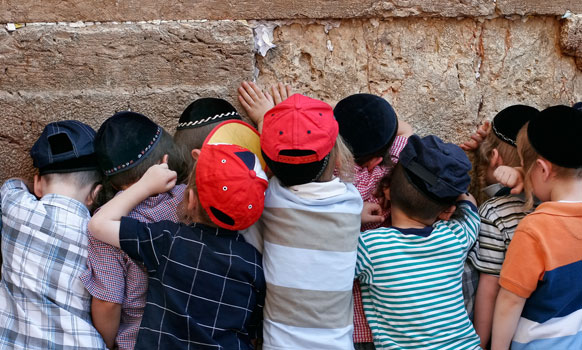
A Three Weeks How-To Guide
A special time of mourning for the Beis HaMikdash interrupts our regularly scheduled summer fun each year, as we enter into the three weeks leading up to Tisha b’Av (the 9th of Av). The saddest day in the Jewish Calendar, Tisha b’Av marks the destruction of the Temples, as well as several other major tragedies in Jewish History.
The mourning begins with Shiva Assar b’Tammuz (the Fast of the Seventeenth of Tammuz, which fell on this past Shabbos and was commemorated Sunday) and officially ends the morning after Tisha b’Av. These weeks are known as “bein hametzarim” (between the distresses or narrows). During this time, the walls of Jerusalem were breached by the Romans. For Ashkenazim, specific laws of mourning apply to the entire period and additional ones apply during the first nine days of Av, while some Sefardim are stringent during the Nine Days in particular. All observant Jews increase their mourning customs during the week and day of Tisha b’Av itself.
Since it is regarded as a National Time of Calamity, many Jews take extra care during this time with their personal safety. Here is a short breakdown of the prohibitions of the Three Weeks, Nine Days, and Tisha b’Av itself.
The Three Weeks:
Music – Playing and listening to musical instruments both as live or recorded music can bring this happiness, so each are prohibited. Music teachers are allowed to teach until Rosh Chodesh Av, and musicians can play for non-Jewish audiences during that time. According to some opinions, recorded music can be listened to if it’s in the background, and its purpose is to help an activity (like exercising or driving) be conducted more successfully. Even when done without music, dancing is prohibited, but singing without instruments is allowed during the entire period.
Shehecheyanu (New Items) – There is a custom to wait on buying new items (or making a bracha on a new fruit) during times of mourning. Outside of Israel, there is a minhag to allow one to make a shecheyanu on Shabbos of the Three Weeks until Rosh Chodesh Av. “Unimportant items” such as socks or t-shirts are buyable until Rosh Chodesh Av, but special clothing such as a nice suit, sheitel or shoes are different. Items upon which one would normally make a shehecheyanu cannot be purchased to be worn during the Three Weeks, (but can be purchased to be worn after Tisha b’Av). Other pleasurable items such as a nice piece of furniture should not be purchased, unless it will benefit more than one person. The bracha on such an item would be “Hatov v’Hameitiv” instead of Shehechyanu.
Haircuts and Shaving – According to custom, men, women and children all do not cut their hair for the entire three weeks. Women who are married or dating are allowed to shave their legs, tweeze their eyebrows and cut hair where necessary for tznius or immersion in a mikvah. Children whose hair grows rapidly or a man whose mustache gets in the way of eating can be lenient. Businessmen whose livelihood would be hurt by their not shaving can consult a rabbi for additional allowances.
Building One’s Home – Decorating and building / construction projects cannot take place during the Nine Days, but painting or flooring can be done until Rosh Chodesh. People move houses during the Three Weeks but some people avoid business matters such as closing on a sale.
The Nine Days:
The Mishna says “As Av enters we decrease our joy.” From the onset of Rosh Chodesh Av through the morning after Tisha b’Av, the level of mourning increases, as do our prohibitions.
Meat and Wine – Break out the dairy, vegan and fish recipes. Meat and wine bring joy, so they are prohibited except on Shabbos.
Weddings – Both Sefardim and Ashkenazim refrain from weddings now. Most people postpone vorts and other “optional or moveable” simchas to a different week. Since it is timely, a bris would proceed as usual.
Swimming / Pleasurable Bathing – No swimming is allowed during the Nine Days, and we even modify how we shower to make it less relaxing, by using colder water and only washing one body part at a time.
Newly Laundered Clothing – As mourners, we aren’t allowed to wear fresh clothing (with the exception of undergarments). We “prepare” our clothes by briefly wearing each item we foresee needing during the Nine Days ahead of time. Because of this, doing laundry is also prohibited with the exception of children’s clothing.
Tisha B’Av:
On erev Tisha b’Av, we prepare physically and mentally for a 25 hour fast. During a final meal known as the Seuda Hamafsekes, we sit on the floor, not interacting with our families and eating egg dipped in ashes with plain bread. Along with all of the restrictions of the Nine Days, the Five Prohibitions begin at candlelighting time.
Eating – No food or drink is allowed.
Anointing – No creams, lotions or moisturizers are permitted.
Bathing – One may wash up to the knuckles of the hands, or to get dirt off of one’s body.
Wearing Leather Shoes – Get out your Crocs, Keds and Jelly Shoes.
Marital Relations – During a time of mourning, intimacy is off limits.
In addition, people do not learn Torah unless it is on topics related to mourning, national calamity or reading the traditional Eicha (the book of Lamentations). People sit on the floor until midday on Tisha b’Av, and don’t wrap tallis and tefillin until then either.
After the fast goes out at nightfall, the restrictions of the Nine Days continue until midday on the Tenth of Av, when all restrictions of the Three Weeks comes to a close.
If you found this content meaningful and want to help further our mission through our Keter, Makom, and Tikun branches, please consider becoming a Change Maker today.







